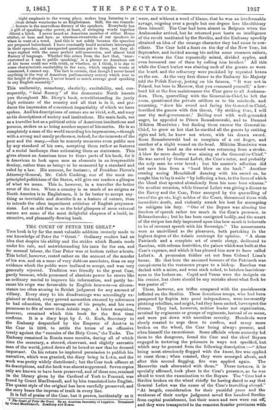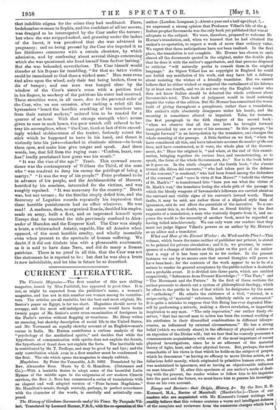THE COURT OF PETER THE GREAT.*
Tins book is by far the most valuable addition recently made to our knowledge of Peter the " Great." Ordinary readers had an idea that despite his ability and the strides which Russia made under his rule, and notwithstanding his taste for the sea, and for manual labour, the Czar Peter was at bottom rather a brute. This belief,_ however, rested rather on the account of the murder of his son, and on a mass of very dubious anecdotes, than on any evidence which the public were inclined to accept, and was very generally rejected. Tradition was friendly to the great Czar, partly because, while possessed of absolute power he strove like an ordinary mortal to improve his information, and partly be- cause his reign was favourable to English interests—a circum- stance too often atoning in British judgment for any amount of villany. Every story to his disadvantage was accordingly ex- plained or denied, every proved accusation excused by references to bad education, the savageness of his people, and his own proneness to fits of more than Asiatic rage. A latent suspicion, however, remained which this book for the first time confirms. It is a diary kept by J. G. Korb, Secretary to the Embassy despatched by the Emperor of Austria to the Czar in 1698, to settle the terms of an offensive treaty against the " enemies of the Holy Cross," the Turks. The Embassy remained in Russia some months, during all of which time the secretary, a shrewd, observant, and slightly sarcastic man of the world, jotted down all he heard or saw that he deemed important. On his return he implored permission to publish his narrative, which was granted, the diary being in Latin, and the work was pretty widely distributed ; but the Czar took offence at its descriptions, and the book was almost suppressed. Seven copies only are known to have been preserved, and of these one, retained in the library given by the Cardinal of York to Frascati, was found by Count MacDonnell, and by him translated into English. The quaint style of the original has been carefully preserved, and the story bears the impress of truth in every line. It is full of praise of the Czar, but it proves, incidentally as it
• The Court of .Peter the Great. By en Austrian Secretary of Legation. Translated by Count NaeDonnell. Bradbury and Evans.
were, and without a word of blame, that he was an irredeemable savage, reigning over a people but one degree less bloodthirsty than himself. The Czar had been absent iu Belgium when the Ambassador arrived, but he returned post haste on intelligence of the revolt meditated by the Strelitz, and the Embassy speedily obtained an idea of the strange character they had come to con- ciliate. The Czar held a. feast on the day of the New Year, 1st. September, and invited among his nobles some common sailors, "with whom the Czar repeatedly mixed, divided apples, and even honoured one of them by calling him brother." All this. while the Court barber was shaving such of the guests as wore the beard, and the refractory were punished by repeated boxes on the ear. At the very first dinner to the Embassy his Majesty told the Polish Envoy, jesting on his fatness, " It was not in Poland, but here in Moscow, that you crammed yourself," a low- bred hit at the free maintenance the Czar gave to all Ambassa- dors. Then, quarrelling with the General-in-Chief, he left the room, questioned the private soldiers as to his misdeeds, and returning, "drew his sword and facing the General-in-Chief, horrified the guests with this threat, 'By striking thus, I will mar thy mal-government.' Boiling over with well-grounded anger, he appealed to Prince Romadonowski, and to Dumnoi Mikitim Mosciwicz ; but finding them excuse the General-in- Chief, he grew so hot that he startled all the guests by striking right and left, he knew not where, with his drawn sword_ RuesRomadonowski had to complain of a cut finger, and another of a slight wound on the head. Mikitim Mosciwicz was hurt iu the hand as the sword was returning from a stroke.. A blow far more deadly was aiming at the General-in-Chief." He was saved by General Lefort, the Czar's tutor, and probably the only man he ever loved ; but his master's affection did not save him from a "hard blow on the back." Another- evening seeing Meuchikoff dancing with his sword on, he- taught him to lay it aside " by inflicting a box, to the force of which the blood that spouted abundantly from his nose bore witness."- On another occasion, while General Lefort was giving a dinner to the Envoy and the Czar, Peter annoyed by the quarrelling of two of the guests, high nobles of the Court, threatened them with immediate death, and violently struck his host for attempting to mitigate his fury. "One of the Boyars was abusing the freedom of speech rather too much in the Czar's presence, in Bebraschensko ; but he has been castigated bodily, and the smart. of the stripes has duly impressed upon him how much it behovette to be of reverent speech with his Sovereign." The amusements were as uncivilized as the pleasures, both partaking in the highest degree of the Asiatic contempt for opinion. " A sham Patriarch and a complete set of scenic clergy, dedicated to. Bacchus, with solemn festivities, the palace which was built at the Czar's expense, and which it has pleased him now to have called Lefort's. A procession thither set out from Colonel Lima's house. He that bore the assumed honours of the Patriarch was- conspicuous in the vestments proper to a bishop. Bacchus was decked with a mitre, and went stark naked, to betoken lascivious- ness to the lookers on. Cupid and Venus were the insignia on his crozier, lest there should be any mistake about what flock her was pastor of."
These, however, are trifles compared with the punishments- inflicted on the Strelitz. These licentious troops, who had been pampered by Sophia into quasi independence, were incessantly plotting rebellion, and might, had they been united, have upset the throne. They had, however, neither leader nor organization, revolted by regiments or groups of regiments, instead of en masse, and were put down with merciless severity. Hundreds were slowly roasted to urge them to confess, and many more broken on the wheel, the Czar being always present, and often himself the executioner. Some officials whose curiosity led. them to the dungeons, found the Czar and the chief Boyars engaged in torturing the prisoners in ways not specified, but which may be guessed from the following description :—" After being most atrociously flogged with the knout, fire was applied to roast them ; when roasted, they were scourged afresh, and after this second flogging, fire was applied again. The Muscovite rack alternated with these." These tortures, it is specially affirmed, took place in the Czar's presence, as lie was- afraid to trust the examination to the Boyars. The " Czar had a Strelitz broken on the wheel chiefly for having dared to say that General Lefort was the cause of the Czar's travelling abroad." "At length, consideration for their youthful years and the weakness of their unripe judgment saved five hundred Strelitz from capital punishment, but their noses and ears were cut off, and they were transported to the remotest frontier provinces with that indelible stigma for the crime they bad meditated. Fiera, bedchamber-woman to Sophia, and the confidant of all her secrets, was dragged to be interrogated by the Czar under the torture ; but when she was stripped naked, and groaning under the lashes of the knout, it was perceived that she was advanced in pregnancy; and on being pressed by the Czar she imputed it to her libidinous commerce with a certain chorister, by which admission, and by confessing about several things concerning which she was questioned, she freed herself from further lashing." But she was beheaded, nevertheless. The Czar himself would thunder at his Boyars for trembling, "for that no fatter victim could be immolated to God than a wicked man." Men were even tied alive upon the wheel, only their feet being broken, there to die of hunger ; and one man was hanged close by the window of the Czar's sister's room with a petition tied in his fingers, in mockery of the petitions his sister had received. These atrocities were, in all cases, due to the personal order of the Czar, who, on one occasion, after racking a rebel till the bystanders "heard the horrible crackling of his members torn from their natural sockets," ordered him to be roasted for a quarter of an hour. With that strange strength which seems given to men in such hours, the poor wretch still refused to be- tray his accomplices, when "the Czar, tired at last of this exceed- ingly wicked stubbornness of the traitor, furiously raised the stick which he happened to have in his hand, and thrust it violently into his jaws—clenched in obstinate silence—to break them open, and make him give tongue and speak. And these words, too, that fell from the raging man : Confess, beast, con- fess I' loudly proclaimed how great was his wrath."
" It was the vice of the age !" Trash. This crowned execu- tioner was the contemporary of William the Third, of the mau who " was resolved to deny his enemy the privilege of being a martyr." " It was the way of his people!" Peter professed to be in advance of his people, and the Archimandiite of Moscow, horrified by his cruelties, interceded for the victims, and was roughly repulsed. " It was necessary for the country." Death was, but not torture ; for the Strelitz simply defied him, and the Secretary of Legation records repeatedly his impression that these horrible punishments had no effect whatever. He was mad! A madman, then, re-organized Russia,-doubled his empire, made an army, built a fleet, and so impressed himself upon Europe that he received the title previously confined to Alex- ander of Macedon and the Emperor Karl. The Czar was simply a brute, a whitewashed Asiatic, capable, like all Asiatics when -opposed, of the most horrible cruelty, and wholly insensible even when present to the spectacle of human suffering. We doubt if it did not titulate him with a pleasurable excitement, as it is said to have done Nero, and did do many a Roman patrician. There is no proof in all this, that the Czar was not the statesman he is reputed to be ; but that he was also a brute is now indubitable, and let him in future be so described.































 Previous page
Previous page